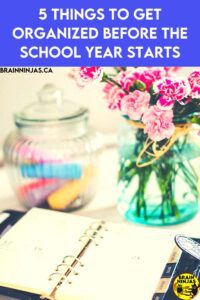
We firmly believe that teachers should enjoy the time off they have and shouldn’t be forced to work. It’s the time we all need to replenish and prepare, but if you’re a little like us, you thrive when you are well-planned and prepared. It’s time to get organized for the year ahead.
That’s why we wrote this post. These are the things we try to get done over the summer months so we don’t have to worry about them in the first days of school. Having a simple plan makes answering the bombardment of questions from students so much easier.
Are you getting ready to start a new school year? Well, keep reading because these common sense things are the things you should be thinking about. We’re sharing them because these are all things we messed up in the past and want to pass down our wisdom.
These are five things you should get organized before your first class
Get Handing Things Out Organized
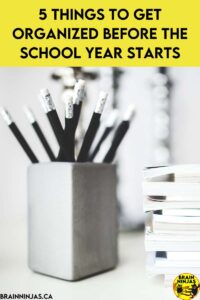
Choose a system for classroom handouts. There are so many things that need to be handed out each and every day: classwork, books, notices, or returned work. You need to have a plan to get these items to your students quickly and efficiently.
New Work
When we have new work, we have a few students hand it out, but generally, we ask students to take one and pass them on. It takes a little practice with younger students to master this, but we start on the first day. We also train students who end up with the end of the pile to bring it up to us. Students who get missed learn this is where the extra copies are and help themselves. We tend to hand out pages by subject area, but if there are several pages for one day, we hand out all of them at once, get the class calmed down and then begin teaching.
Student Books
When student books have names on them, we leave small piles on several students’ desks during breaks like recess or before class starts. Students are trained that when they come in, they hand out the books on their desks. You’ll soon learn which of your students are always late and then you’ll avoid putting these items on their desks.
Graded Work
Student work that has been graded is handed out by us to protect student privacy. We do this when students are working on a task where they can work on their own for a bit. Sometimes we’ll purposely let students practice math skills on their devices while we do this. Then as a class, we’ll put all the materials away. We find spending 10-15 minutes a week all at once gets the job done.
Storing Other Materials
When we prepare materials that will be handed out, we have a file folder system. All the pages are arranged by subject and put into the file folder holder in the order they’ll be used. It’s super fast, though it takes a little bit of organizing at the beginning.
When students need materials like textbooks or devices, each of these has numbers on them. We usually call out even, odd, multiples of 3 or any other combination and students get up and help themselves. We do the same when we’re putting the materials away. It keeps everyone from crowding the shelf all at once.
Extra School Supplies
Think about how you’ll store the extra student supplies and how you’ll distribute those supplies to your students when they need them.
We have a supply of Ziploc bags with a blank label. Each student gets one on the first day of school, where we put all of our little supplies like pencils and erasers. Students write their names on the bags and we store these in a box in our back storage room.
We pull out the box occasionally so everyone can stock up. Our big supplies (papers, binders, report folders) go in a separate box until we’re ready to use them. We usually sort these out a few days into school when we start to use them.
A “Why You Should Get Organized” story
A few years back we had a new teacher join our staff. She was new to elementary school despite having taught junior high and high school previously. She allowed all her students to keep all their supplies. By the second week of school, some of her students had already lost everything they owned and she was at a loss as to why. This is why you need a plan. There were paper airplanes everywhere!
Students Need to Be Taught to Get Organized, Too
Students need to be taught how to look after their materials in a caring and non-judgmental way. Don’t berate students. Help them learn to care for their supplies.
Some teachers prefer to have communal supplies. As a student, I hated that I would look after my belongings and then little Johnny, who pretty much ate them, got to use my things because I needed to share.
It caused me so much anxiety as a child that I vowed never to do that to my students.
Our classroom is now a bit of both. Students have their own supplies, but we have a bin of orphaned materials that students can borrow when they’ve misplaced their own. Sometimes we even add a few extras.
It doesn’t matter what you decide as long as you decide before all those little darlings show up on the first day with their year’s worth of supplies. It will show parents that your classroom will not be a free for all.
At the end of the year, we return all the leftover supplies and the kids are often surprised by how much is left over. Students have the option to donate leftover used materials with this permission form. You can find it in our Resource Library, along with many other general classroom forms to help you organize your classroom. Or we’ll send you a copy when you sign up for our email list.
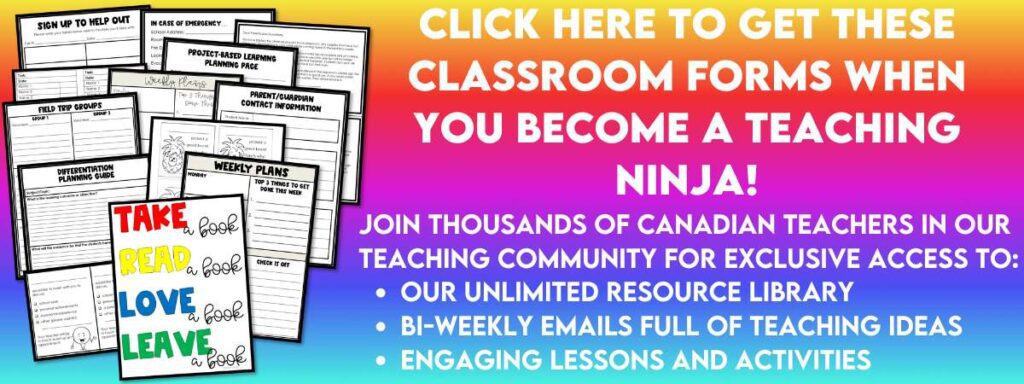
Important Legal Papers
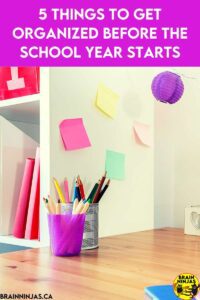
Have a place for important papers like field trip forms and papers parents sign that don’t go directly to the office. These types of papers usually contain personal information for students or signatures, so it’s important to keep them secure and safe.
Our district requires us to keep all field trip forms and we hand them in at the end of the year. We keep a magazine holder and clip all the forms together inside. When the year is complete, it is easy to hand everything in. If you’re not sure what your school or district’s policy is, make a note to find the answer in your staff handbook or ask a staff member who is not new to the school.
When we need to collect specific forms from the whole class, we include a class list and check off their names as forms are returned. This makes tracking down missing forms easy.
Find out what your school does about money that accompanies forms. Be sure to follow the directions from the office staff to the letter. Not following instructions makes their job harder and you need them on your side. They can save your butt (like when your bus doesn’t show up for a field trip), so keep them in good favour.
These forms include field trip forms, lunch orders, IEP signature forms, notes from parents or anything else you might be legally required to keep as a record. Get organized before papers arrive. It will save you plenty of time later.
“Important” Papers
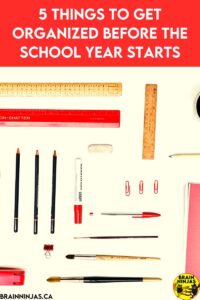
When you attend staff meetings, do you get a pile of handouts that you need to keep for information purposes? Our school is getting better at putting all of these documents into a Google Drive instead of printing them out, but if your school is still using paper, where are you keeping all those papers?
We have a staff binder for each member in our school, so we place all these papers into that binder as we get them. It’s way too much work to try to sift through all that stuff when we’re busy. It also contains the staff handbook, so when we need an answer, we can usually find it in that binder.
If your school does not have a system like this, it’s easy enough for you to create one of your own. Start a binder and add a few dividers in it. As you get papers, sort them and keep them in the binder.
If your school hands out agendas for meetings, write on them and keep them in this binder. You’ll have records of what was said in meetings.
If you need help getting rid of the paper at the end of the year, be sure to check out our Clean the Clutter post.
Get organized for celebrations ahead of time
Will you be celebrating with your students during the year? Create a sign-up page for the holiday events, like Halloween, Christmas or Valentine’s Day, where students and parents can sign up to bring treats to the Your Meet the Teacher event. You can get a sign-up sheet in our Resource Library, or we can email a copy directly to your inbox when you sign up for our email list.
Having a sign-up list prevents duplicates of foods. A list allows you to plan ahead for other snacks.
If you catch parents at the beginning of the year, they’re more likely to be willing to send treats. Include a list of possible treats like vegetables, fruit or cheese and crackers. As the event comes closer, you can send the individual parents reminders about their treat commitments. We encourage you to ask your families to bring healthy treats instead of junk food. No one wants a classroom celebration with thirty different kinds of cupcakes.
Check how to handle different celebrations or holidays in your school. Do this before planning any events. Your special events do not have to be real holidays. You can celebrate reading, writing, math or Thursdays for all you want.
And with anything, keep in mind your school population. Some schools have strict policies about outside food due to costs, allergies or other reasons. If your families cannot provide food treats, maybe they can volunteer some time to read to your students, clean up or supervise a small group activity like a craft that you plan and prepare.
Are You Ready to Go?
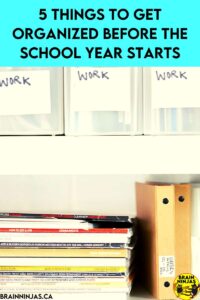
It seems like that isn’t much, but they are just five simple things we do. You might want to read our 10 Things We Do on the First Day of School post for a few more back to school ideas. It can help you plan out your first day with students.
Now don’t forget to get plenty of rest and enjoy your time off. That time is very important to restoring your health and keeping your mental health intact. We are planners. It makes us happy, but even we understand how important it is to take the time to recharge.
What are some of the ways you get ready for a new school year? Share your thoughts and ideas with us in the comments below. We’d love to hear from you.






